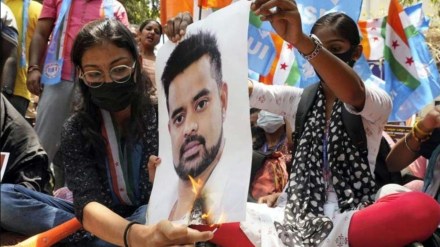A recent revelation regarding a Janata Dal (Secular) Member of Parliament’s (MP) Prajwal Revanna’s unapproved trip outside of India has ignited a political firestorm. The MP supposedly travelled to Germany without obtaining political clearance or a visa note from the Ministry of External Affairs (MEA), raising questions about protocol and accountability.
At the weekly briefing on May 2, 2024, the official spokesperson of MEA, Randhir Jaiswal confirmed in response to several questions that neither political clearance nor a visa note was sought or issued for the MP’s travel to Germany. Notably, diplomatic passport holders generally do not require a visa to enter Germany, but proper procedures for clearance remain imperative.
Who is Revanna?
He is the grandson of former Prime Minister H D Deve Gowda, and is accused of sexual harassment of several women. It is believed that he is in Germany. Meanwhile, the Janata Dal (Secular) has already suspended the Hassan MP.
What exactly MEA said on JD (S) MP travel out of India?
“No Political Clearance was either sought from or issued by MEA in respect of the travel of the said MP to Germany. Obviously, no visa note was issued either. No visa is required for diplomatic passport holders to travel to Germany. The Ministry has not issued visa note for any other country.”
In response to another query related to the revocation of the passport of the MP, the spokesperson highlighted the Passport Act of 1967 concerning the potential revocation of passports. However, he clarified that as of now, no directives from any court have been received regarding the revocation of the MP’s passport.
Revocation of the Diplomatic Passport – Official Spokesperson said:
“As regards the possible revocation of the passport of any individual, I would refer you to the relevant provisions of the Passport Act 1967. We are not in receipt of any directions from any court in this regard.”
What does this mean?
According to a former diplomat who wished to remain anonymous, “The lack of proper documentation and approval raises concerns about adherence to established protocols, especially for public officials representing the country. Without the necessary clearance, such travels can undermine diplomatic processes and potentially strain international relations.”
The incident has triggered debates within political circles, with opposition parties demanding transparency and accountability from the JD(S) and the concerned MP. Questions have been raised about whether the trip was personal or official in nature and whether it involved any diplomatic engagements.
Moreover, the absence of political clearance from the MEA suggests a procedural lapse, prompting calls for an investigation into the matter. Critics argue that such actions not only reflect poorly on the individual MP but also on the party’s governance standards.
As the controversy unfolds, there is a growing clamour for clarity and accountability, stressing the importance of adhering to established protocols and ethical standards in diplomatic engagements.
